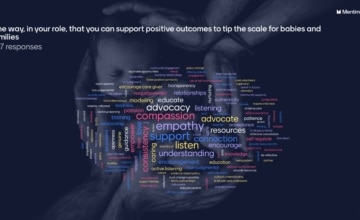Brieanna Gutierrez and Todd A. Landry, Office of Child and Family Services, Maine Department of Health and Human Services, Augusta, Maine
Ana Hicks, Maine Governor’s Office of Policy Innovation and the Future, Augusta, Maine

Abstract
This article describes how Maine has leveraged federal pandemic relief funding, broad public support, and the convergence of multiple economic factors to support the state’s early childhood education system. The specific focus on strengthening the early childhood education workforce is necessary given the integral role early childhood educators play in both the availability and quality of care. Moreover, a strong early childhood education system is vital to the future prosperity of Maine and its residents.
Maine’s Children’s Cabinet was reestablished in 2019 by then newly elected governor Janet Mills. One of the primary focus areas of the Cabinet, which brings together the commissioners from five departments of state government, was ensuring that all Maine children entered kindergarten prepared to succeed. To advance that work, the Cabinet worked in partnership with the Office of Child and Family Services (OCFS) within the Maine Department of Health and Human Services to develop a plan focused on increasing the affordability of early care and education; raising the quality of the early care and education system and supporting families to access quality programming; and recruiting, training, and retaining a diverse workforce of early care educators who are the foundation of Maine’s early care and education system.
Needs Assessment
Maine’s Preschool Development Grant’s Needs Assessment clearly identified that low pay for early childhood educators was a key barrier to recruiting and retaining a qualified workforce. Data from the May 2021 federal Bureau of Labor Statistics indicated that the mean wage for an early childhood educator in Maine is $14.90 per hour, which equates to $31,000 a year (U.S. Bureau of Labor Statistics, 2022). To put this in perspective, the median household income in Maine in 2021 was more than double the early childhood educator mean wage at $63,000 (U.S. Census Bureau, 2022). Over the last few years, early childhood education administrators and owners have reported significant challenges in competing with other employers and those challenges only increased as other employers raised wages to recruit new staff in a tight labor market. These same strong labor markets have continued to drive demand for affordable child care as parents seek to enter or remain in the workforce.
Addressing Compensation and Workforce Development
In spring 2021, two members of Maine’s legislature, House Speaker Ryan Fecteau and Representative Rebecca Millett, introduced separate bills to strengthen the early childhood education system. Speaker Fecteau’s bill proposed a system of salary supplements while Rep. Millett’s bill proposed refundable tax credits for early childhood educators and early childhood education programs. Both bills were carried over from the 2021 to the 2022 legislative session, allowing OCFS additional time to implement initiatives to support the early childhood education system using federal relief funding and analyze the impact of those initiatives.
An agreement was also reached to partner with Maine’s existing Zero to Three Workgroup, which included community stakeholders, to examine the potential policy options for enhancing the compensation of early childhood educators. This Workgroup focused significant time and energy on gathering input and feedback from the community, as well as learning about the successes and challenges of the work of other states on this topic. The Workgroup convened five listening sessions with early childhood education center directors, family child care owners and directors, and early childhood educators; engaged in conversations with program administrators from five states; and held four stakeholder meetings with business leaders, advocates, policy experts, and other stakeholders. The conclusion of this work was the Zero
Learn More
Early Care and Education Annual Report
State of Maine Needs Assessment: Vulnerable Children Birth to Age 5 and Their Families
to Three Workgroup’s publication of a policy paper, State Policy Options for Early Care Educator Compensation, in January 2022 (Maine’s Zero to Three Workgroup & Maine Applied Research) which explored various state policy options for early care educator compensation, including the advantages and disadvantages of each policy approach.
Key takeaways from the Zero to Three Workgroup’s stakeholder engagement included:
- early childhood education directors reported some staff shortages and difficulty retaining staff,
- a large majority of the stakeholders advocated for a tiered approach based on the education and experience of the educators, and
- stakeholders expressed a clear preference for wage supplements paid monthly over annual payments or tax credits.
Salary Supplements
Concurrent to the introduction of Speaker Fecteau and Rep. Millett’s bills and the work of the Zero to Three Workgroup, OCFS was developing and implementing the Child Care Plan for Maine. OCFS recognized that in order to address the immediate needs of families, providers, and educators, a mechanism was needed to increase wages without increasing the cost of care for families. As a result, OCFS included in its Child Care Plan an initiative using American Rescue Plan Act (ARPA) funding for wage stipends of $200 per month for each early childhood educator in a licensed early childhood education program providing direct care. These monthly stipends were provided directly to early childhood education programs as part of Maine’s ARPA stabilization grant program that provided a total of over $70 million in direct funding to early childhood educators statewide.
Distribution of the monthly $200 stipends began in October 2021. Providers were required to pass on the full amount of the stipend to individual educators in their programs as a salary supplement. A total of 81,925 wage stipends were distributed from October 2021 through September 2022, totaling $16.3 million.
In February of 2022, Governor Mills submitted a Supplemental Budget Proposal that included more than $12 million in State General Funds to continue the salary supplement program beyond the expiration of ARPA Stabilization Grant funding. The Legislature included this proposal in the final bipartisan budget passed in June 2022. Monthly distribution of the state-funded $200 per month salary supplements began in October 2022, following the end of the ARPA-funded stipends in September 2022. By July 1, 2023, OCFS will establish a program of tiered supplements based on the experience and education of the individual early childhood educators with the amount of the supplement increasing as the educator’s qualifications increase. The budget included funding for positions for OCFS to administer the ongoing salary supplement system, and work is currently underway to engage with stakeholders and develop the policy and procedures that will underly the forthcoming tiered system.
Education and Professional Development
Concurrent to much of the work regarding wages and salary supplements, OCFS has been working in conjunction with the Maine Roads to Quality Professional Development Network to strengthen the workforce through professional development opportunities, accreditation support, and a workforce career lattice. OCFS funds a scholarship program administrated by the Maine Association for the Education of Young Children to increase access to educational opportunities for those seeking higher education in the field of early childhood education.
A Strong Future
Early care educators are often referred to as the workforce behind the workforce. Without access to quality early childhood education options, parents in Maine are unable to work, and both employers and families are negatively impacted. Maine’s efforts to increase wages for early childhood educators was driven by the recognition of the role these individuals play in both the economy and in the future of our state as they build a strong foundation for future learning and success among Maine’s youngest children. Providing immediate and direct financial support to educators, as well as additional professional development opportunities, has demonstrated the state’s recognition of the importance of their work and the vital role they play in Maine’s current and future prosperity. That recognition was furthered with the enactment of a permanent system of state-funded salary supplements that will continue to provide financial support to educators without negatively impacting the cost of early childhood education for Maine families.
Authors
Brieanna Gutierrez, JD, is the communication and compliance manager for the Maine Office of Child and Family Services. The work of the Office of Child and Family Services includes early care and education, child welfare, and children’s behavioral health services. Ms. Gutierrez holds a bachelor’s degree in psychology from the University of Maine at Farmington and a juris doctorate from the University of Maine School of Law. Prior to joining the Office of Child and Family Services, Ms. Gutierrez worked in private practice and served as the legal publication specialist for the Maine Judicial Branch.
Todd A. Landry, MBA, EdD, serves as the director of the Maine Office of Child and Family Services. He holds a bachelor’s degree in chemistry from Lamar University, Beaumont, Texas, and a master’s degree in business administration from the Cox School of Business at Southern Methodist University, Dallas, Texas. He earned his doctoral degree in educational leadership from the Simmons School of Education and Human Development at Southern Methodist University, Dallas, Texas, in 2018. Dr. Landry most recently was chief executive officer of Lena Pope in Fort Worth, Texas, a nonprofit that serves children and families with an array of prevention and early intervention services, including child care, public education, mental health counseling, and juvenile justice. He previously served as director of Nebraska’s Division of Child and Family Services and has served on national boards, including the Child Welfare League of America, a national coalition of private and public agencies working to improve the lives of vulnerable children and families.
Ana Hicks, MA, is a senior policy analyst and Children’s Cabinet coordinator with the Governor’s Office of Policy Innovation and the Future. In her role as Children’s Cabinet coordinator, Ms. Hicks helps to direct and facilitate the work of Governor Mills’ Children’s Cabinet. Prior to joining the Mills administration, Ms. Hicks worked for the Center on Budget and Policy Priorities, where she provided policy advice and technical assistance to state-level nonprofit organizations across the country to support their efforts to strengthen and improve the Supplemental Nutrition Assistance Program. Prior to that, Ms. Hicks served for 4 years as chief of staff to the Speaker of the Maine House where she was responsible for developing and advancing a broad policy agenda that included expanding access to affordable health care and supporting seniors to live independently in their homes. From 2004–2012, she was a senior policy analyst at Maine Equal Justice Partners where she worked to strengthen Maine’s critical antipoverty programs. Ms. Hicks began her career as a field organizer for the Children’s Defense Fund. She has a master’s degree in urban policy and child development from Tufts University.
Suggested Citation
Gutierrez, B., Landry, T. A., & Hicks, A. (2023). PERSPECTIVES: Breaking new ground—Maine’s efforts to support the early childhood education workforce ZERO TO THREE Journal, 43(3), 23–25.
References
Maine’s Zero to Three Workgroup & Maine Applied Research. (2022). State policy options for early childhood educator compensation. www1.maine.gov/dhhs/sites/maine.gov.dhhs/files/inline-files/Final%20ECE%20Workforce%20Report%20Jan%202022.pdf
U.S. Bureau of Labor Statistics. (2022). Occupational employment and wage statistics, childcare workers. U.S. Bureau of Labor Statistics. www.bls.gov/oes/current/oes399011.htm#st
U.S. Census Bureau. (2022). U.S. Census Bureau quickfacts: Maine. www.census.gov/quickfacts/fact/table/ME/INC110221



